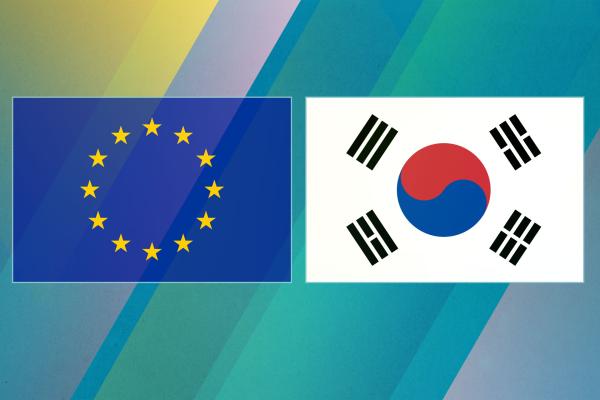- Country or region
- South Korea
- Trade topics
- Negotiations and agreements
- Trade policy
The EU’s trade relations with the Republic of Korea* are governed by the EU-Republic of Korea Free Trade Agreement (‘FTA’ hereinafter), provisionally applied since July 2011 and formally ratified in December 2015. The FTA was the EU’s first with an Asian country and the first to include a chapter on trade and sustainable development.
To complement the FTA, the EU and the Republic of Korea launched negotiations for a digital trade agreement on 31 October 2023, building on the EU-Republic of Korea Digital Trade Principles agreed in 2022. The two sides intend to agree on a set of ambitious, modern digital trade rules, building on and complementing the existing preferential trade framework.
*Covering the territory of the Republic of Korea, commonly known as South Korea.
Trade picture
- The Republic of Korea is the EU's 8th largest trade partner in goods, whereas the EU is Korea's 3rd largest trade partner in goods.
- Since the entry into force of the FTA on 1 July 2011, bilateral trade and investment have expanded remarkably. Total bilateral trade in goods amounted to ca. €130 billion in 2023, up by 106% from 2011 (ca. €63 billion).
- Bilateral trade in goods remains highly concentrated on industrial products, which represented 96% of such trade in 2023, including machinery and mechanical appliances (32%), transportation equipment (21%), and chemical products (18%).
- Bilateral trade in agricultural and fishery products has gradually increased, accounting for just below 4% in 2023. Of EU exports to Korea, the share of agricultural and fishery products is at just below 9% in 2023.
- Bilateral trade in services increased by 63% between 2012 and 2022, amounting to ca. €31 billion in 2022 (latest available data). In 2022, trade in services remained concentrated on several services including transport (41%); other business services (19%); as well as telecommunications, computer and information services (11%).
- The EU remains the Republic of Korea's biggest foreign direct investor, with an FDI stock of €54 billion (2022), ahead of Japan and the United States. Among EU Member States, the Netherlands, Germany and Luxembourg are the largest investors in 2022, with financial, insurance and other professional services attracting significant investments. Korean investments into the EU have also grown and reached €40.6 billion in 2022: about ¾ of the volume of EU outward stocks. Korean investments are particularly focused on the electric vehicles sector, with Hungary, Poland and Germany being the largest investment destinations in 2022.
The EU and the Republic of Korea
The Republic of Korea is one of the most dynamic economies in the world, with a GDP of about €1.5 trillion. It ranks as the 13th largest economy in the world and the 4th largest economy in Asia. Additionally, the Republic of Korea is a highly successful economy at the technological forefront, spending 4.9% of its GDP on R&D, ahead of the EU at 2.3%. This is reflected in the country’s industrial strengths, which include high-tech and R&D intensive products such as semiconductors, pharmaceuticals and biotechnology, consumer electronics, and the shipbuilding and automotive sectors, including EV batteries.
In 2023, the Republic of Korea’s bilateral trade in goods with the EU reached ca. €130 billion, up by 106% from 2011 when the FTA was first applied. The FTA removed the majority of import duties in 2011, with those remaining removed after five years on 1 July 2016 – with the exception of duties on a limited number of agricultural products.
The agreement also addresses non-tariff barriers to trade, specifically in the automotive, pharmaceutical, medical devices and electronics sectors. The FTA has also created new opportunities for market access in services and investments, and includes provisions in areas such as competition policy, government procurement, intellectual property rights, and transparency in regulation.
Regarding the implementation of the FTA, progress has been made with regard to the Republic of Korea’s recognition of the EU’s regionalisation measures to control outbreaks of African swine fever and the highly pathogenic avian influenza in 2022.
Additionally, and following continuous engagement between the EU, Member States, and the Republic of Korea, the Korean government abolished local content requirements in the offshore wind energy sector, which had allowed for higher prices for windfarms that have a minimum of 50% domestic components. Meanwhile, the EU continues to closely follow developments in the sector advocating for predictability and transparency of the permission process and auction rounds.
More on the implementation of the FTA
- The Commission's annual reports on the implementation of FTAs contain a section on the Republic of Korea.
- Factsheet: EU-Korea FTA: a quick reading guide
- Factsheet: 10 key benefits of the EU-Korea FTA
The FTA is also the first such agreement of the EU that includes a chapter on trade and sustainable development (TSD). The chapter reaffirms the commitment of both parties to contribute to sustainable development, with binding provisions upholding and promoting social and environmental standards.
Following the activation of the bilateral dispute resolution mechanism under this chapter, the Republic of Korea is in the process of amending its labour laws in the context of ratifying International Labour Organisation Conventions.
More on sustainable development (including dispute settlement) in the EU-Korea FTA
To complement the FTA, the EU and the Republic of Korea launched negotiations for a Digital Trade Agreement on 31 October 2023, building on the EU-Republic of Korea Digital Trade Principles agreed in 2022. The two sides intend to agree on a set of ambitious, modern digital trade rules, building on and complementing the existing preferential trade framework.
Beyond trade, in 2010, the EU and the Republic of Korea upgraded their broader relationship to a Strategic Partnership. On 10 May 2010 the two sides signed a Framework Agreement, which entered into force on 1 June 2014. The agreement provides a basis for strengthened cooperation on major political and global issues such as human rights, non-proliferation of weapons of mass destruction, counter-terrorism, climate change, and energy security.
Committees and Dialogues
To ensure full implementation, the FTA established a number of specialised committees and working groups between the two parties. These bodies also provide an opportunity to seek resolutions to market access concerns and to engage in closer regulatory cooperation. They report to the annual Trade Committee between the EU and the Republic of Korea at ministerial level, which ensures the FTA’s proper operation.
Technical committee meetings - agendas and reports
Trading with the Republic of Korea
- Importing into the EU from Korea
- EU trade defence measures on imports from Korea
- Exporting from the EU to Korea
- Trade relations are part of the EU's overall political and economic relations with the Republic of Korea
- The Republic of Korea is a member of the World Trade Organization
- Evaluation of the Free Trade Agreement between the EU and the Republic of Korea
Exporters' stories

The 2011 EU-South Korea trade deal eliminated customs duties enabling AustiAlpin, a climbing equipment maker, to start doing business there. The company now exports around 80% of its products and is eager to reap the benefits of more EU trade deals, such as with Canada.
Latest news
The EU and the Republic of Korea have concluded negotiations for a landmark Digital Trade Agreement (DTA), underscoring their commitment to a strong and reliable partnership that is fit to face the fast-paced digital developments of today.
French and Irish beef producers will once again be able to export beef to the Republic of Korea, thanks to the European Commission’s efforts to negotiate the removal of local restrictions on EU beef.
Joint statement by European Commission Executive Vice-President Valdis Dombrovskis and Korean Minister for Trade Dukgeun Ahn on the launch of negotiations on an EU-Korea digital trade agreement.

